New connections, new narrative forms
By Elisabeth Wellershaus
At the closing event of the Bundesweite Artist Labs 2023 (B.A.L.L.), it became clear just how committed the independent theater scene is to exchanging ideas with each other and with the audience – and how it cultivates mindful interaction with each other in challenging times.
Friday, October 20, 2023: The foyer at Kampnagel is still buzzing and people are chatting. Performers who have traveled to Hamburg for the B.A.L.L. greet each other exuberantly. Journalists meet colleagues for coffee, visitors marvel at the project stands that present the lab work of recent months in every corner of the Kulturfabrik. But at around 5 p.m., Sivan Ben Yishai takes to the stage to deliver the opening speech. And it becomes quiet. There is a barely tangible atmosphere in the air on this rainy afternoon. This weekend is supposed to be about the reorientation of the independent theater scene since the outbreak of pandemic, about searching for and finding new audiences. However, the heated debates of recent weeks have shown how difficult the current global situation and political developments make it to find or meet each other. So even the opening of cultural events these days are balancing acts. Sivan Ben Yishai already gave the speech she is about to deliver a week ago at the award ceremony of the Berliner Theatertreffens des Bundes. At Kampnagel, too, she will succeed in doing something that is rare these days: In quiet, clear tones, she will circle the distortions of the present in amazement. And she will speak of a theater that is currently characterized as much by its power as by its fragility.
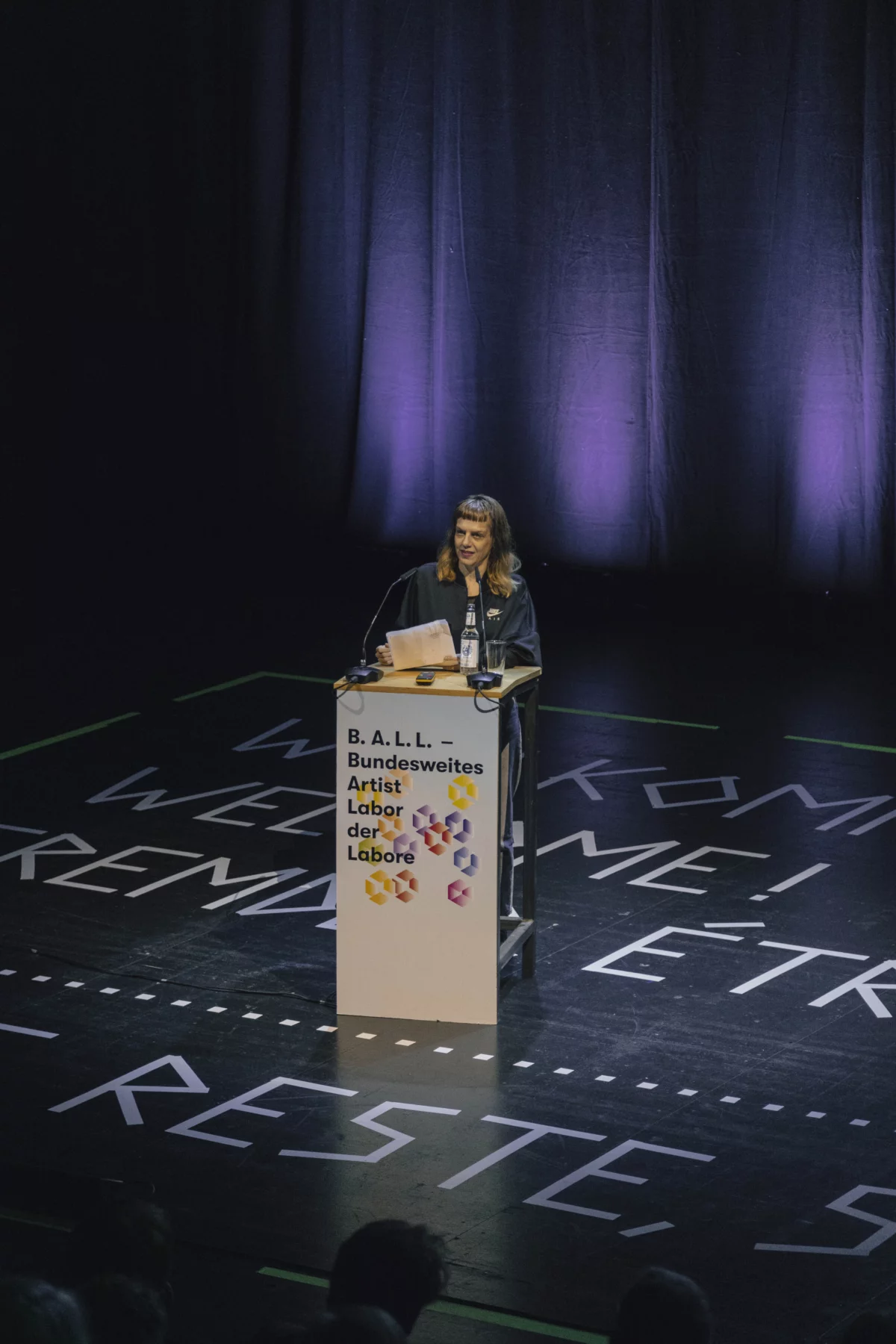 © Alexandra Polina
© Alexandra Polina
Sivan Ben Yishai presents her text "Theater der Leerzeichen" at the opening of the B.A.L.L.
"Before you know it, the theater institution can become an empty vessel that is instrumentalized by power and right-wing nationalism." With these words, Sivan Ben Yishai addresses the audience. "Before you know it," she says, "[the theater institution] can become a site of incited discourse against the intellectual, against the non-binary and the dialectical". Her words echo forcefully through the largest hall at Kampnagel. Curators and artistic directors, artists, friends and family, young professionals and old hands, people who feel they belong to interwoven communities, they all listen to the Israeli playwright, who poetically touches upon brutal realities. At a time when words often bluster and positional reflexes come thick and fast, she urges us to reflect on times when poets and social workers, historians and storytellers are perhaps needed even more than politicians and military experts.
Her words underline the mood that was already palpable in the foyer. This B.A.L.L. does not have the same fighting spirit that characterized the conclusion of the Artist Labs last year. There is not the same desire to confront cultural policy. Rather, the focus this year seems to be quite clearly on empathetic encounters. Many of the participants seem to be relying on the possibilities of exchange and synergies and hoping for a despite everything in bleak times.
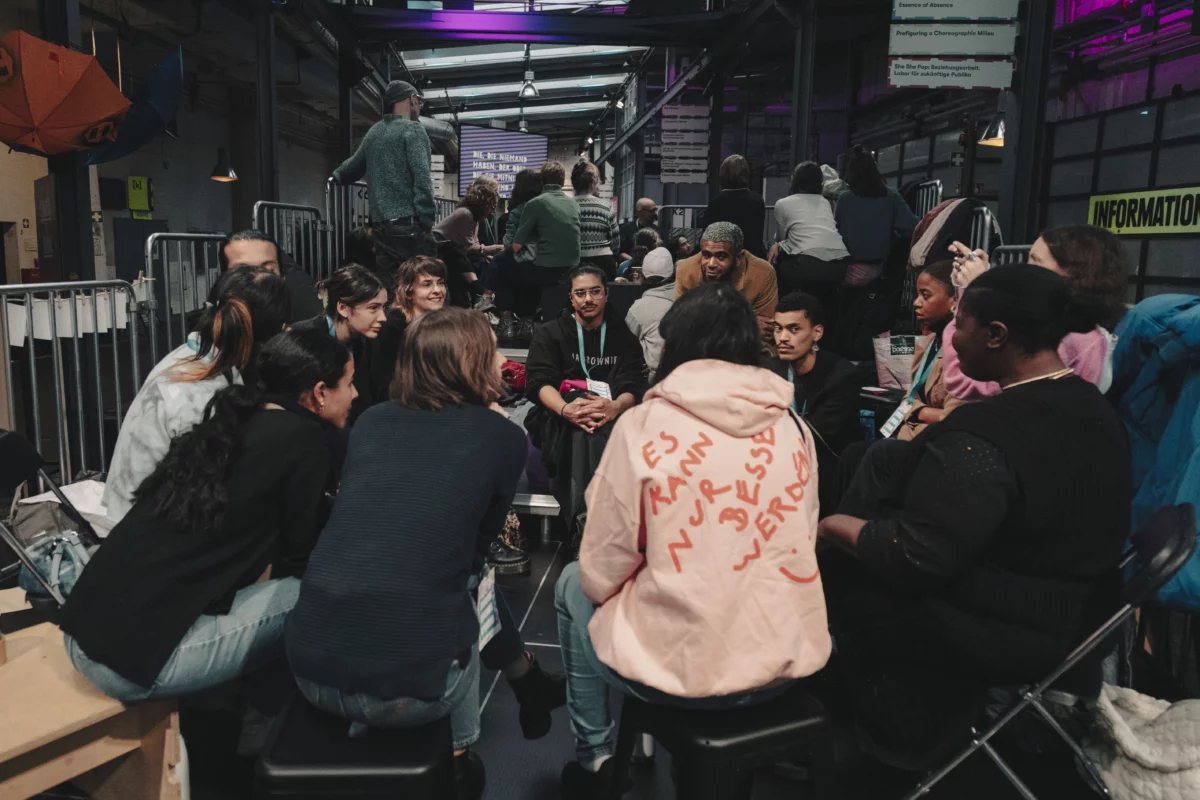 © Alexandra Polina
© Alexandra Polina
Island time in the Kampnagel foyer.
With their themes, the artists in the participating labs show that a collaborative, transdisciplinary approach is more important than ever in post-pandemic times. Their creative explorations of the past few years, which are completely different in terms of form, content and methods, describe how much has happened during this time. How relevant the multi-perspective view of independent theater projects can be and how differently the relationship between audiences and performers can be conceived. Between classic table talks and panel discussions, visitors can – sometimes while wearing bathing costumes – meet in the open air, take part in movement workshops, attend performances by Rimini Protokoll and Simone Aughterlony or get creative in the evening with the Queereeoké collective.
On the way to Halls K1 and K4, signs with the names of the 64 labs hang from the ceiling. The word “Publikum” (“audience”) appears frequently, often in combination with the word “Zukunft” (“future”). The „neustart:publikum“ ("new:start audience") lab, for example, asks how audience members can become more involved against the background of changing cultural and social contexts, while the "Publikumsversteher" (Understanding audiences) lab explores the possibilities of intercollegiate communication. Another lab is called „Die Stadt als leere Kulisse“ ("The city as an empty backdrop") and examines how inner-city changes affect theater audiences. Another describes how the national puppet theater scene envisions future audience connections with the words „Gefordert, gefördert, getan“ ("Demanded, supported, done"). Many are dedicated to the interweaving of different needs, where the approaches of independent artists' groups meet the requirements and ideas of funding institutions and cultural policy. But not infrequently, attempts are made to think together about contradictions, especially to reconsider issues of marginalization – for example in the labs of Vierte Welt („gib mir ein kleines bisschen Sicherheit“ / "Give me a little bit of security") or of Migrantpolitan („Kreative Allianzen schmieden“ / "Forging creative alliances").
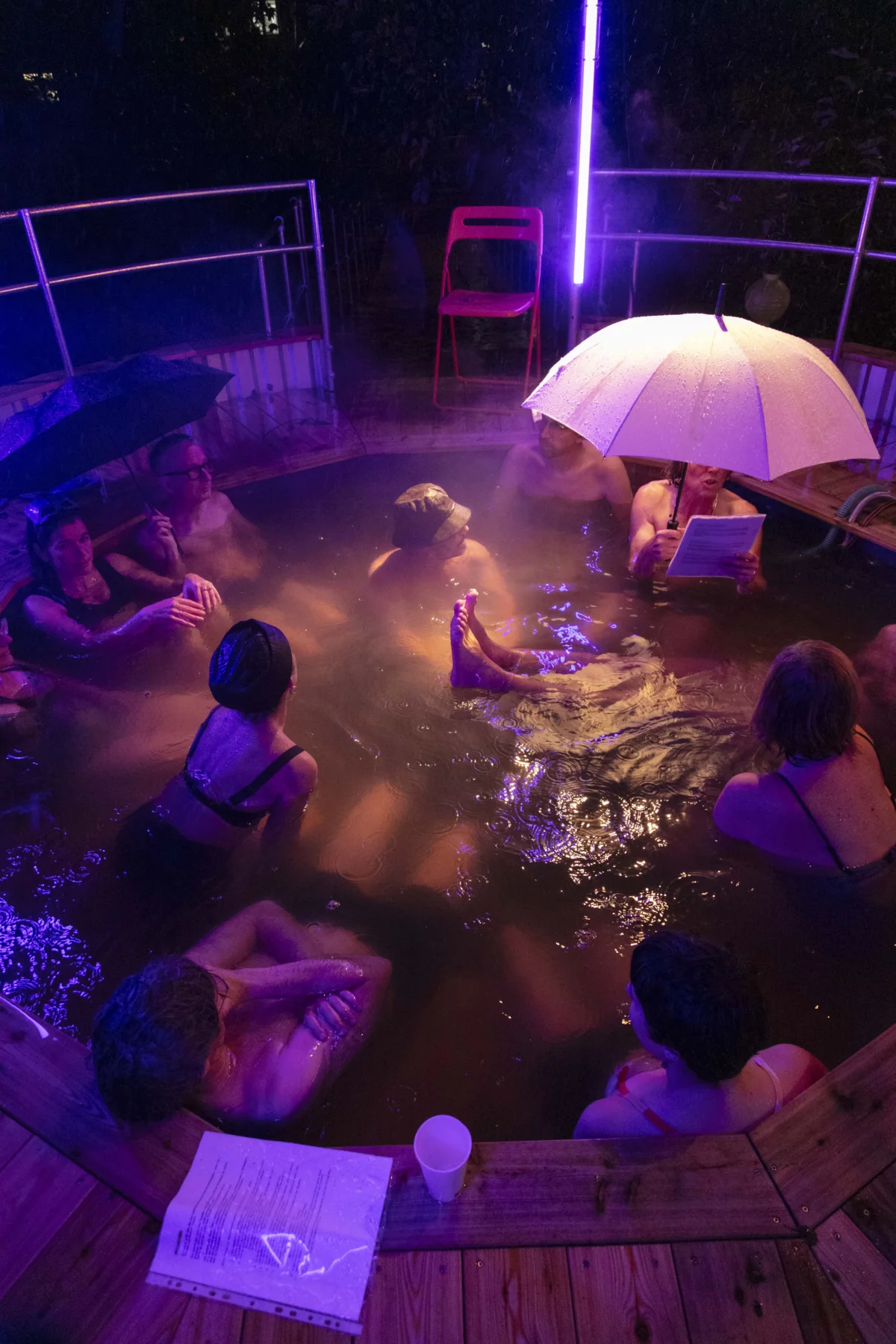 © Alexandra Polina
© Alexandra Polina
Talks in the open air onsen
In her speech, Sivan Ben Yishai also spoke of the power of realignment. She had said: "Perhaps intersectional theater is a silent, subversive network, a technology that operates in the in-between, in the blank space, the silent signifier, which, by separating words – creates a connection between them by being silent – enables an interruption and a rearrangement by being absent – creates logic by being a gap."
The opening evening at Kampnagel already hints at what a critical, independent, daring theater could look like in these times. But it also announces the overwhelming abundance of who, how, where, what and when that awaits visitors this weekend. In order to get a handle on the wealth of topics that are currently concentrated in the independent theater scene, a 10-member committee was engaged by the Fonds Darstellende Künste and commissioned to select the 64 Artist Labs. This committee brings together artists who are all part of the independent performing arts community themselves, but who now act as an advisory body for the Fonds and thus have become the audience themselves. When they take to the stage toward the end of the opening event, it becomes clear how well this dual role has worked. This is made evident by the fact that Benjamin Foerster-Baldenius, Dan Thy Nguyen, Mable Preach, Moritz von Rappard, Laia Ribera Cañénguez, Eva Stöhr, Anne Schneider, Felizitas Stilleke, Mateusz Szymanówka and Caspar Weimann managed to write an impressive speech together as a group of 10.
This speech begins with a warning to adopt a more differentiated social perspective. With a call to take a stand against the "ever-growing inhuman right-wing extremist tendencies in this country", "as well as against all forms of nationalist politics and radical terror worldwide". This is followed by a lengthy version, which is read out by the curators in turn, which examines the working practices that are addressed in the labs.
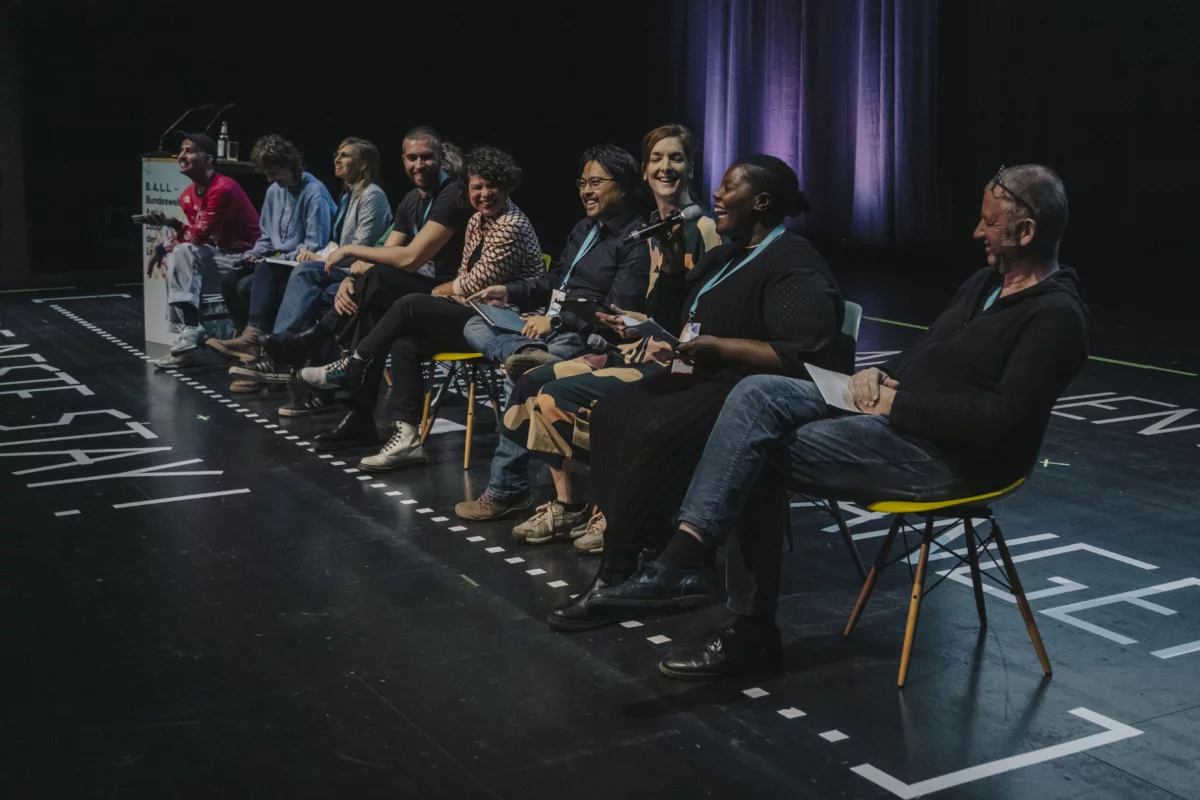 © Alexandra Polina
© Alexandra Polina
Opening speech of the committee for the selection of the Labs.
There is a great need to explore forms of voicelessness, says Laia Ribera Cañénguez – precisely because criticism of social inequality still all too often goes unheard. She emphasizes how important it is to expand or transform funding struc-tures so that migrant, transnational and multilingual artists can find entry points and space in the independent scene. "The hierarchies practiced by funding organiza-tions and art institutions between artists, audiences and staff" need to be ques-tioned in order to create frameworks and formats "that are sensitive to discrimination and social injustice".
With funding from NEUSTART KULTUR, this debate has already taken place under different conditions, adds dramaturge Felizitas Stilleke. "In some places even with-out cycles of exhaustion and excessive pressure – and if it does, then at least it’s paid a little more fairly." On the one hand, this helps us out of precarious working conditions, and on the other, it ensures "that we can build and maintain the rela-tionships that are necessary for our art, which are not based on the work, but on the artistic process and cooperation".
Yet it remains a feat of strength to entrust oneself to these processes while still work-ing under often precarious conditions. This can be heard in all of the foyer discus-sions this evening. Many artists also spoke about how exhausting it is to avoid cur-rent debate trends and not get lost in hasty commentary on the global political situa-tion. Curators and artists talk about how against this background they did not come to the event unbiased. How relieved they were after the speeches by Sivan Ben Yishai, the curators and after a short performance by Amelie Deuflhard, Andreas Görgen and Holger Bergmann, who sought and mostly found the rather light tones between the serious topicality. The vocabulary that I collect in passing conversa-tions this evening changes from overwhelming to diverse, from emotional to cool, dense to frayed, loud to impressive, annoying to wonderful.
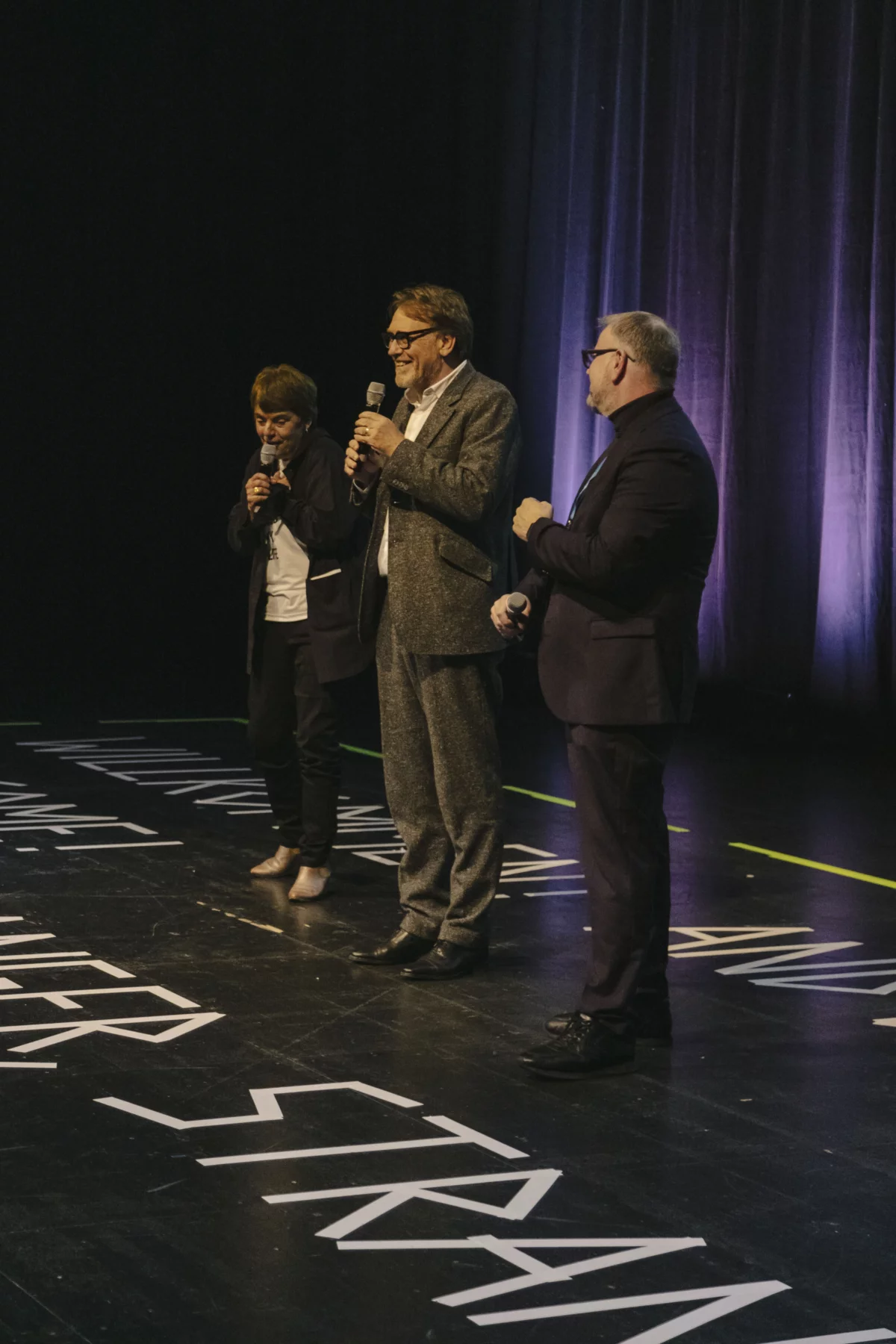 © Alexandra Polina
© Alexandra Polina
Amelie Deuflhard (Kampnagel), Dr. Andreas Görgen, Ministerial Director at the Federal Government Commissioner for Culture and the Media, and Holger Bergmann (Fonds Darstellende Künste) open the B.A.L.L..
Some say it clearly, others hint at it between the lines: How much the talk about solidarity, community and living together has become distorted and shifted in recent weeks. The thoughts that Sivan Ben Yishai articulated when introducing the event are brought up repeatedly. That theater could be imagined as an empty space "in which solidarities could grow like a political mycelium and spread in and on the ground, between and around nationalism, racism and demagogic populism".
In moments when compassion and a common language are tapering off, it is time to create new spaces and reinterpret old ones. Ben Yishai speaks of abstract, unexplored spaces – of blank spaces and empty spaces. And on the opening evening, the words and ideas of a radically heterogeneous independent theater scene already resonate in these spaces.